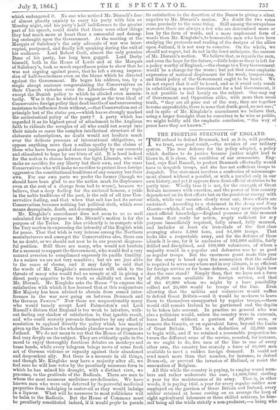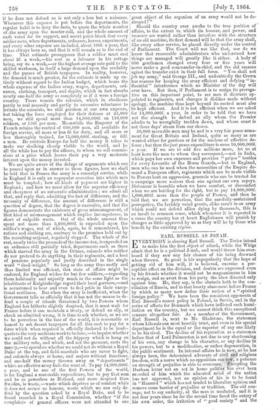THE FIGHTING STRENGTH OF ENGLAND.
THE refusal to defend Denmark, bad as it is, will produce, we trust, one good result,—the revision of our military system. The true defence for the policy adopted, a policy which declines to do justice because justice might lead to blows is, it is clear, the condition of our armaments. Eng- land, says Earl Russell, to protect Denmark effectually would have to despatch troops, and she has not sufficient troops to despatch. The statement involves a confession of' mismanage- ment almost without a parallel, or with a parallel only in our own history, and yet it appears from demi-official statistics to be partly true. Wholly true it is not, for the strength of Great Britain increases with exertion, and the power of this country depends not on its first efforts but on the persistent energy with which, while our enemies slowly wear out, those efforts are sustained. According to a statement in the Amery and Navy Gazette—which, if not official, shows a very near approach to exact official knowledge—England possesses at this moment a home fleet ready for action, amply sufficient for my purpose immediately required, fully armed, fully manned, and includes at least six iron-clads of the first class averaging above 3,000 tons, and 84,000 troops. That looks like a respectable army, and for the defence of these islands it is one, for it is exclusive of 102,000 militia, fairly drilled and disciplined, and 160,000 volunteers, of whom a majority would in a popular and defensive war be as good as regular troops. But the enormous grant made this year for the army is based upon the assumption that the soldier is required to serve anywhere and in any climate, is as efficient for foreign service as for home defence, and in that light how does the ease stand ? Simply thus, that we have not a force of 50,000 men available for foreign service, and that of the 40,000 whom we might by a bare possibility collect not 20,000 would be troops of the line. Even allowing that the militia and volunteers would suffice to defend Great Britain—and it would be madness to leave them to themselves unsupported by regular troops,—there would still remain Ireland to be garrisoned and the depots to be taken into account. In practice no general who was also a politician would, unless the country were in extremis, leave Ireland without a garrison of 20,000 men, or remove the Guards, or an equivalent force, beyond the limits of Great Britain. This is a deduction of 32,000 men to begin with, and if we retained a reasonable proportion be- tween the different arms of the service, counted, for instance, as we ought to do, five men of the line to one of every other arm, the country has scarcely a force of 40,000 men available to meet a sudden foreign demand. It could not send much more than that number, for instance, to defend Denmark, or prevent the invasion of Holland, or resist the annexation of Belgium. All this while the country is paying, to employ round num- hers and rather understate the case, 14,000,000/. sterling a year for the maintenance of its army. That is, in other words, it is paying 166/. a year for every regular soldier now employed on the garrison of Great Britain and Ireland, every soldier retained at home costing on an average the keep of eight agricultural labourers or three skilled artizans, he him- self being all the while strictly a non-producer,—a being who if he does not defend us is not only a loss but a nuisance. Whenever this expense is put before the departments, the regular habit is to deny the facts, to quote the whole number of.the army upon the muster-roll, and the whole amount of cash voted for its support, and assert point-blank that every soldier costs, when departments, ordnance, horses, experiments, and every other expense are included, about 100/. a year, that it has always been so, and that it will remain so to the end of time. That estimate presupposes that a soldier must cost about 2/, a week,—his cost as a labourer in his cottage being, say 4s. a week,—or the highest average rate paid to the skilled workman, in itself a large demand upon the credulity and the purses of British taxpayers. In reality, however, the demand is much greater, for the estimate is made up en- , tirely without regard to the Indian budget, which bears the whole expense of the Indian army, wages, departments, ord- nance, clothing, transport, and depfits, which in fact absorbs nearly one-half the army as completely as if it were a foreign country. There remain the colonies, which in obedience partly to real necessity and partly to excessive reluctance to irritate the colonists, we still garrison at our own expense, but taking the force employed for their defence at 25,000 men, we still spend more than 14,000,000/. on 110,000 soldiers, or 136/. per man. Meanwhile the Emperor of the French retains the control of 600,000 men, all available for foreign service, all more or less fit for duty, and all more or less thoroughly trained, for 13,000,000/. sterling, or 651. a man. He controls Europe for half the money it takes to make our skulking clearly visible to the world, and he all the while has to pay the officers, to whom we sell commis- sions at a price which leaves their pay a very moderate interest upon the money invested. We are quite aware of the deluge of arguments which can be poured upon us in answer to these figures, how we shall be told that in France the army is a conscript service, while in England it is only an unpopular avocation into which men must be tempted ; how all kinds of payment are higher in England ; and how we must allow for the superior efficiency and cheapness of an autocratic administration ; we admit all that, and reply that, admitting the fact of difference, and the necessity of difference, the amount of difference is still a question of degree, that the degree is excessive, and that the figures demonstrate the existence of gross mismanagement, of that kind of mismanagement which implies incompetence, in short of culpable waste. Out of the whole amount thus spent not more than 3,000,000/. is expended upon the soldier's wages, out of which, again, be it remembered, his rations and clothing are, contrary to the promises held out by the recruiting-serjeant, regularly stopped. The whole of the rest, nearly twice the proceeds of the income-tax, is expended on an ordnance still partially tried, departments such as those which starved the army in the Crimea, colonels who neither do nor pretend to do anything in their regiments, and a host of pensions popularly and justly described in the single word "dead-weight." So long as the army thus costly and thus limited was efficient, this state of affairs might be endured, for England wishes for but few soldiers,—regarding them habitually and unjustly much in the same light as the inhabitants of Knightsbridge regard their local garrison,—and is accustomed to bear and even to feel pride in their excep- tional costliness. But when the army is inefficient, when the Government tells us officially that it has not the means to de- fend a couple of islands threatened by two Powers whom England has hitherto slightly despised, that it must wait for France before it can maintain a treaty, or defend an ally, or check an admitted wrong, it is time to ask whether, as we are to be powerless in the face of the world, it is reasonable or honest to ask decent taxpayers for all this cash to pay for a force which when required is officially declared to be inade- quate to the very moderate work to be done,—to inquire whether we could not do without all the frippery which is hung on the military robe, and which, and not the garment, costs the money,—to speculate whether we could not do without a Royal Duke at the top, and field-marshals who are never to fight, and colonels always at home, and majors without functions, and one-half the money thrown away on " departments " which no effective army feels the want of. To pay 14,000,000/. a year, and be one of the first Powers of the world, is for England a reasonable expenditure, but to pay that sum and be as powerless as Holland, and more despised than Sweden, is waste,—waste which deprives us of comfort while it does not secure us honour, waste which we can only de- fend by the question asked by a Royal Duke, and to be found recorded in a Royal Commission, whether "if the complaints of general officers were not attended to one his own order, the irritation of " good society" and the great object of the organism of an army would not be de- stroyed ? "
Should the country ever awake to the true position of affairs, to the extent to. which its honour, and power, and treasure are wasted rather than interfere with the structure of an old machine, its first demand will be that the army shall, like every other service, be placed directly under the control of Parliament. The Court will not like that, nor do we know that reasonable administrators who understand how things are managed will greatly like it either. A body of 600 gentlemen changed every four or five years will never make a good commander-in-chief, and the old reasons aginst the transfer exist in their full force. "You shall not job my army," said George III., and undoubtedly the Crown has reasons for keeping the army efficient and defying " in- fluential " interference which no Minister of the day will ever have. But then, if Parliament is to resign its preroga- tive on this important point, to see men it distrusts ap- pointed to regiments, and changes it dislikes made without apology, the machine thus kept beyond its control must also be kept efficient. And it is not efficient when we are asked for 14,000,000/. a year, in order to be told that we have not the strength to defend an ally whom the Premier admits to be wrongfully trodden down, and whose coast is not three days' steam from our shores.
50,000 moveable men may be and is a very fair peace arma- ment for Great Britain and Ireland, quite as many as are wanted either for garrison or for the nucleus of effective de- fence ; but then thejust peace expenditure is some 10,000,0001. a year. If we are to add five millions more, let us at least have the men to whom they correspond,—not in India, which pays her own expenses and provides " prizes " besides for every favourite of the Horse Guards,—but in England, men who can be used when the necessities of the Empire de- mand a European effort, regiments which can be made visible to Powers bent on aggression, generals who can be trusted for a campaign more serious than one against our own sepoys.
Dishonour is bearable when we have comfort, or discomfort when we are battling for the right, but to pay 14,000,000/.
1,000,000/. more than the people of France, and then be told that we are powerless, that the carefully-maintained prerogative, the lavishly voted grants, alike result in an army which could not defend allies dying by thousands, this is an insult to common sense, which whenever it is repeated in a cause the country has at heart Englishmen will punish by changes as little approved by us as they will be by those who benefit by the existing rigime.































 Previous page
Previous page